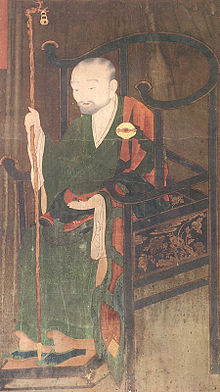Jinul
Jinul | |
|---|---|
 | |
| Title | Zen Master |
| Personal | |
| Born | 1158 |
| Died | 1210 |
| Religion | Buddhism |
| School | Seon |
| Senior posting | |
| Successor | Hyesim (혜심/ tuệ kham: 1178~1234) |
This articleneeds additional citations forverification.(March 2024) |
| Part ofa serieson |
| Zen Buddhism |
|---|
 |
Jinul Puril Bojo Daesa(Korean:보조지눌;Hanja:Phổ chiếu tri nột,"Bojo Jinul"; 1158–1210), often calledJinulorChinulfor short, was aKoreanmonk of theGoryeoperiod, who is considered to be the most influential figure in the formation ofKorean Seon(Zen)Buddhism.He is credited as the founder of theJogye Order,by working to unify the disparate sects inKorean Buddhisminto a cohesive organization.
Biography[edit]
Bojo Jinul's birthname was Jeong and by age 15 he left his family to be ordained under Seon Master Jonghwi of the Sagulsan School, one of thenine mountain schoolsof Seon, receiving the ordination name "Jinul". This occurred in 1173. Regarding his training, Buswell observes:
"The young monk's relationship with his preceptor does not seem to have been especially close, for his biographer states that he never had a permanent teacher. Chinul's intellect and his natural inclination toward solitude and retreat had been noticeable since his youth; with the fractious climate of the church in his days, he probably felt more comfortable learning to get along on his own considerable talents in seclusion. From early on in his vocation Chinul made up for thelack of personal instructionby drawing inspiration from the Buddhist scriptures. In the spirit of self-reliance that is central to Buddhism, he took responsibility for his own spiritual development and followed the path of practice outlined in the scriptures and confirmed through his own Sŏn meditation. Chinul's progress in Buddhist practice was, therefore, based on using scriptural instructions to perfect formal Sŏn practice. "[1]
By 1182, Jinul passed the royal examination for monks and qualified for a higher administrative position, but turned it down to join the Seonsanghaat Bojesa inPyongyang.The community being uninterested in his efforts to reform the retreat community, he moved to Cheongwonsa at Changpyeong, then Bomunsa on Hagasan.
During this period of travel and study, Jinul was said to have studied the entireTripiṭakaand had a series of awakenings. Jinul sought to establish a new movement within Korean Seon which he called the "samadhiandprajñāsociety "(정혜사;Định tuệ xã;Jeonghyesa). This movement's goal was to establish a new community of disciplined, pure-minded practitioners deep in the mountains. Jinul eventually accomplished this mission with the founding ofSonggwangsaonJogyesan,and in the process theJogye Order,which taught a comprehensive approach to Buddhism including meditation, doctrine, chanting and lectures. By 1209, he completed his magnum opus theExcerpts from the Dharma Collection and Special Practice Record with Personal Notes(법집별행록절요병입사기;Pháp tập biệt hành lục tiết yếu tịnh nhập tư ký;beopjip pyeolhaeng nok cheolyo byeongip sagi), an extensive exploration of various schools ofChan Buddhismin China, with extensive commentaries on the writings of the Chinese monkGuifeng Zongmias well as personal notes.
This earned him the respect of theGoryeo,and in particularKing Huijong,who ordered that Mount Songgwangsan be renamed Jogyesan in his honor. Upon his death in 1210, he was given a posthumous title of honor by King Huijong as well.
Teachings[edit]
Essence-Function[edit]
Essence-Function(체용;Thể dụng) is a key concept ofKorean Buddhism.Essence-Function takes a particular form in the philosophy and writings of Jinul.[2]
View of Nirvana[edit]
Jinul viewedNirvanaas a sublime essence that is present in all beings. This essence is the very nature of Buddha and has always been present in beings. Writing on the faith in such matters held by his own school, Jinul states:
Right faith in the patriarchal sect... does not believe in conditioned causes or effects. Rather, it stresses faith that everyone is originally a Buddha, that everyone possesses the impeccable self-nature, and that the sublime essence of nirvana is complete in everyone. There is no need to search elsewhere; since time immemorial, it has been innate in everyone.[3]
Jinul further believed that the true nature of all people is unchanging and that their minds are ultimately numinous and marked by awareness, even when seemingly in a state of delusion. In a discussion of Buddhist schools, he writes:
In the present condensation, I treat the school of Ho-tse first, primarily so that people who are practicing meditation will be able to awaken first to the fact that, whether deluded or awakened, their own minds are numinous, aware, and never dark and their nature is unchanging.[4]
See also[edit]
References[edit]
- ^The Korean Approach to Zen: The Collected Works of Chinul, Translated with an Introduction by Robert E. Buswell Jr., pages 20-21, University of Hawaii Press, 1983
- ^Charles A. Muller, "The Key Operative Concepts in Korean Buddhist Syncretic Philosophy: Interpenetration ( thông đạt ) and Essence-Function ( thể dụng ) in Wŏnhyo, Chinul and Kihwa" cited inBulletin of Toyo Gakuen UniversityNo. 3 (March 1995): 33-48.
- ^Robert Buswell, Jr.,Tracing Back the Radiance: Chinul's Korean Way of Zen(Honolulu: University of Hawaii Press, 1991), 120.
- ^Robert Buswell, Jr.,Tracing Back the Radiance: Chinul's Korean Way of Zen(Honolulu: University of Hawaii Press, 1991), 152.
Further reading[edit]
- Buswell Jr., Robert E.Tracing Back the Radiance: Chinul's Korean Way of Zen.Honolulu: University of Hawaii Press, 1991.
- Buswell Jr., Robert E.The Korean Approach to Zen: The Collected Works of Chinul.Honolulu: University of Hawaii Press, 1983.
- Keel, Hee-Sung.Chinul: The Founder of the Korean Sŏn Tradition.Berkeley Buddhist Studies Series, 6. Berkeley: University of California at Berkeley, 1984.
- Ko, Ik-chin. "Chinul's Explanation of Emptiness in the Meditation School." InBuddhism in Koryŏ: A Royal Religion,103-138. Korea Research Monograph 22. Berkeley: University of California at Berkeley, 1996
External links[edit]
- "Jinul: Dharma Talks".Archived fromthe originalon 26 July 2012.Retrieved27 December2012.
